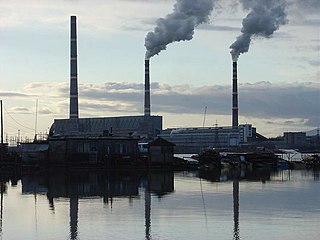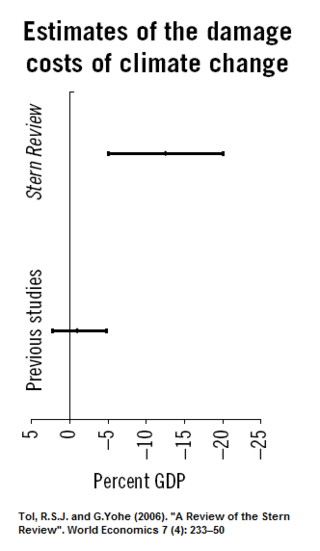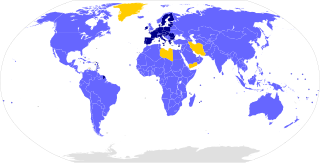
The Kyoto Protocol (Japanese: 京都議定書, Hepburn: Kyōto Giteisho) was an international treaty which extended the 1992 United Nations Framework Convention on Climate Change (UNFCCC) that commits state parties to reduce greenhouse gas emissions, based on the scientific consensus that global warming is occurring and that human-made CO2 emissions are driving it. The Kyoto Protocol was adopted in Kyoto, Japan, on 11 December 1997 and entered into force on 16 February 2005. There were 192 parties (Canada withdrew from the protocol, effective December 2012) to the Protocol in 2020.
The United Nations Framework Convention on Climate Change (UNFCCC) established an international environmental treaty to combat "dangerous human interference with the climate system", in part by stabilizing greenhouse gas concentrations in the atmosphere. It was signed by 154 states at the United Nations Conference on Environment and Development (UNCED), informally known as the Earth Summit, held in Rio de Janeiro from 3 to 14 June 1992. Its original secretariat was in Geneva but relocated to Bonn in 1996. It entered into force on 21 March 1994.

A carbon tax is a tax levied on the carbon emissions required to produce goods and services. Carbon taxes are intended to make visible the "hidden" social costs of carbon emissions, which are otherwise felt only in indirect ways like more severe weather events. In this way, they are designed to reduce greenhouse gas emissions by increasing prices of the fossil fuels that emit them when burned. This both decreases demand for goods and services that produce high emissions and incentivizes making them less carbon-intensive. In its simplest form, a carbon tax covers only CO2 emissions; however, it could also cover other greenhouse gases, such as methane or nitrous oxide, by taxing such emissions based on their CO2-equivalent global warming potential. When a hydrocarbon fuel such as coal, petroleum, or natural gas is burned, most or all of its carbon is converted to CO2. Greenhouse gas emissions cause climate change, which damages the environment and human health. This negative externality can be reduced by taxing carbon content at any point in the product cycle. Carbon taxes are thus a type of Pigovian tax.

The Financial Accounting Standards Board (FASB) is a private standard-setting body whose primary purpose is to establish and improve Generally Accepted Accounting Principles (GAAP) within the United States in the public's interest. The Securities and Exchange Commission (SEC) designated the FASB as the organization responsible for setting accounting standards for public companies in the U.S. The FASB replaced the American Institute of Certified Public Accountants' (AICPA) Accounting Principles Board (APB) on July 1, 1973. The FASB is run by the nonprofit Financial Accounting Foundation.
The National Climate Assessment (NCA) is a United States government interagency ongoing effort on climate change science conducted under the auspices of the Global Change Research Act of 1990. The NCA is a major product of the U.S. Global Change Research Program (USGCRP) which coordinates a team of experts and receives input from a Federal Advisory Committee. NCA research is integrated and summarized in the mandatory ongoing National Climate Assessment Reports. The reports are "extensively reviewed by the public and experts, including federal agencies and a panel of the National Academy of Sciences. For the Third National Climate Assessment, released in 2014, USGCRP coordinated hundreds of experts and received advice from a sixty-member Federal Advisory Committee. The Fourth NCA (NCA4) was released in two volumes, in October 2017 and in November 2018.

Nicholas Herbert Stern, Baron Stern of Brentford, is a British economist, banker, and academic. He is the IG Patel Professor of Economics and Government and Chair of the Grantham Research Institute on Climate Change and the Environment at the London School of Economics (LSE), and 2010 Professor of Collège de France. He was President of the British Academy from 2013 to 2017, and was elected Fellow of the Royal Society in 2014.

Climate change mitigation is action to limit climate change by reducing emissions of greenhouse gases or removing those gases from the atmosphere. The recent rise in global average temperature is mostly due to emissions from unabated burning of fossil fuels such as coal, oil, and natural gas. Mitigation can reduce emissions by transitioning to sustainable energy sources, conserving energy, and increasing efficiency. It is possible to remove carbon dioxide from the atmosphere by enlarging forests, restoring wetlands and using other natural and technical processes. Experts call these processes carbon sequestration. Governments and companies have pledged to reduce emissions to prevent dangerous climate change in line with international negotiations to limit warming by reducing emissions.

The economic analysis of climate change explains how economic thinking, tools and techniques are applied to calculate the magnitude and distribution of damage caused by climate change. It also informs the policies and approaches for mitigation and adaptation to climate change from global to household scales. This topic is also inclusive of alternative economic approaches, including ecological economics and degrowth. In a cost–benefit analysis, the trade offs between climate change impacts, adaptation, and mitigation are made explicit. Cost–benefit analyses of climate change are produced using integrated assessment models (IAMs), which incorporate aspects of the natural, social, and economic sciences. The total economic impacts from climate change are difficult to estimate, but increase for higher temperature changes.

Environmental policy is the commitment of an organization or government to the laws, regulations, and other policy mechanisms concerning environmental issues. These issues generally include air and water pollution, waste management, ecosystem management, maintenance of biodiversity, the management of natural resources, wildlife and endangered species. For example, concerning environmental policy, the implementation of an eco-energy-oriented policy at a global level to address the issues of global warming and climate changes could be addressed. Policies concerning energy or regulation of toxic substances including pesticides and many types of industrial waste are part of the topic of environmental policy. This policy can be deliberately taken to influence human activities and thereby prevent undesirable effects on the biophysical environment and natural resources, as well as to make sure that changes in the environment do not have unacceptable effects on humans.

Contraction and Convergence (C&C) is a proposed global framework for reducing greenhouse gas emissions to combat climate change. Conceived by the Global Commons Institute (GCI) in the early 1990s, the Contraction and Convergence strategy consists of reducing overall emissions of greenhouse gases to a safe level (contraction), resulting from every country bringing its emissions per capita to a level which is equal for all countries (convergence). It is intended to form the basis of an international agreement which will reduce carbon dioxide emissions to avoid dangerous climate change, carbon dioxide being the gas that is primarily responsible for changes in the carbon dioxide is one of the primary greenhouse gases responsible for the greenhouse effect.greenhouse effect on Earth. It is expressed as a simple mathematical formula. This formula can be used as a way for the world to stabilize carbon levels at any level. Advocates of Contraction and Convergence stress that negotiations at the United Nations Framework Convention on Climate Change (UNFCCC) are governed sequentially by the 'objective' of the UNFCCC followed by its organising principles. C&C is widely cited and supported.
Richard Douthwaite was a British economist, ecologist, campaigner and writer living in Ireland. He died of cancer at his home near Westport, Co. Mayo aged 69.
The Global Commons Institutegci.org.uk was founded in the United Kingdom in 1990 by Aubrey Meyer and others to campaign for a fair way to tackle climate change.

350.org is an international environmental organization addressing the climate crisis. Its stated goal is to end the use of fossil fuels and transition to renewable energy by building a global, grassroots movement.

Planetary boundaries are a framework to describe limits to the impacts of human activities on the Earth system. Beyond these limits, the environment may not be able to self-regulate anymore. This would mean the Earth system would leave the period of stability of the Holocene, in which human society developed. The framework is based on scientific evidence that human actions, especially those of industrialized societies since the Industrial Revolution, have become the main driver of global environmental change. According to the framework, "transgressing one or more planetary boundaries may be deleterious or even catastrophic due to the risk of crossing thresholds that will trigger non-linear, abrupt environmental change within continental-scale to planetary-scale systems."

The economics of climate change mitigation is part of the economics of climate change related to climate change mitigation, that is actions that are designed to limit the amount of long-term climate change.

Karen Christiana Figueres Olsen is a Costa Rican diplomat who has led national, international and multilateral policy negotiations. She was appointed Executive Secretary of the UN Framework Convention on Climate Change (UNFCCC) in July 2010, six months after the failed COP15 in Copenhagen. During the next six years she worked to rebuild the global climate change negotiating process, leading to the 2015 Paris Agreement, widely recognized as a historic achievement.

The Paris Agreement, often referred to as the Paris Accords or the Paris Climate Accords, is an international treaty on climate change. Adopted in 2015, the agreement covers climate change mitigation, adaptation, and finance. The Paris Agreement was negotiated by 196 parties at the 2015 United Nations Climate Change Conference near Paris, France. As of February 2023, 195 members of the United Nations Framework Convention on Climate Change (UNFCCC) are parties to the agreement. Of the three UNFCCC member states which have not ratified the agreement, the only major emitter is Iran. The United States withdrew from the agreement in 2020, but rejoined in 2021.
A global climate regime is a global framework that aims at regulating the interaction of human activity with the global climate system, to mitigate global climate change. The framework for such a regime was developed by the United Nations Framework Convention on Climate Change, or UNFCCC for short.

A carbon budget is a concept used in climate policy to help set emissions reduction targets in a fair and effective way. It looks at "the maximum amount of cumulative net global anthropogenic carbon dioxide emissions that would result in limiting global warming to a given level". When expressed relative to the pre-industrial period it is referred to as the total carbon budget, and when expressed from a recent specified date it is referred to as the remaining carbon budget.

James Hall, is Professor of Climate and Environmental Risks and former director of the Environmental Change Institute at the University of Oxford. He is director of research at the School of Geography and the Environment, Senior Research Fellow at the Department of Engineering Science and Fellow of Linacre College. Hall is a member of the UK Prime Minister's Council for Science and Technology, Commissioner of the National Infrastructure Commission, and is chair of the Science and Advisory Committee of the International Institute for Applied Systems Analysis. He was appointed as a Fellow of the Royal Academy of Engineering in 2010. He was a member of the Adaptation Sub-Committee of the UK Climate Change Committee from 2009 to 2019. He was appointed as Vice-President of the Institution of Civil Engineers in 2021 with a view to become President in 2024.















